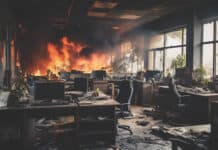Posted by Heidi Schwartz

The International Code Council (ICC) encouraged Congressional support for the Safe Housing for Homeless Veterans Act (HR 2065) in testimony before the Committee on Veterans Affairs Subcommittee on Health. HR 2065 seeks to amend title 38 of the United States Code to require recipients of per diem payments from the Secretary of Veterans Affairs for the provision of services for homeless veterans to comply with codes relevant to operations and level of care provided, and for other purposes. The nonpartisan bill is sponsored by Rep. David McKinley of West Virginia and Rep. Grace Napolitano of California.
“Those of us who work to achieve building safety at both the state and local level appreciate the concern that this bill has for the welfare of our veterans, who are living in housing subsidized by the Department of Veterans Affairs,” said ICC Board Member Robert Drexler testifying before the subcommittee. “The codes assure that when faced with the hazards including fire, windstorm, flooding, and normal or daily use, the building will allow for residents and users to survive, and for first responders to safely rescue building occupants, and minimize property damage.”
In the building sector, the International Residential Code, the International Building Code (IBC), and the International Fire Code (IFC) establish basic requirements for building safety at the time of construction, and in the case of the IFC, at the time of annual inspections, Drexler told the subcommittee. In most U.S. jurisdictions at the state or local level, the IBC and the IFC assure that buildings used for residential care and housing are safe.
“HR 2065 wisely does not attempt to mandate one code or the other for compliance by facilities approved by the Department of Veterans Affairs for reimbursement, but requires a certification from all homes that they meet either the IBC and IFC, or the Life Safety Code (LSC), which are functionally, and from a safety standpoint, equivalent code requirements,” Drexler testified.
Addressing VA concerns about inspection costs in jurisdictions that do not enforce the IFC or LSC, Drexler pointed out the cost to ensure safety would be about $100 or less per annual inspection. It is the clear intent of the bill sponsors, and a worthy goal in our opinion, that veterans who sacrificed so much for freedom should be provided with safe housing, especially when the taxpayer is subsidizing that housing, he told the subcommittee.




















![[VIDEO] Collect Asset Data at the Speed of Walking a Building](https://facilityexecutive.com/wp-content/uploads/2024/02/maxresdefault-324x160.jpg)